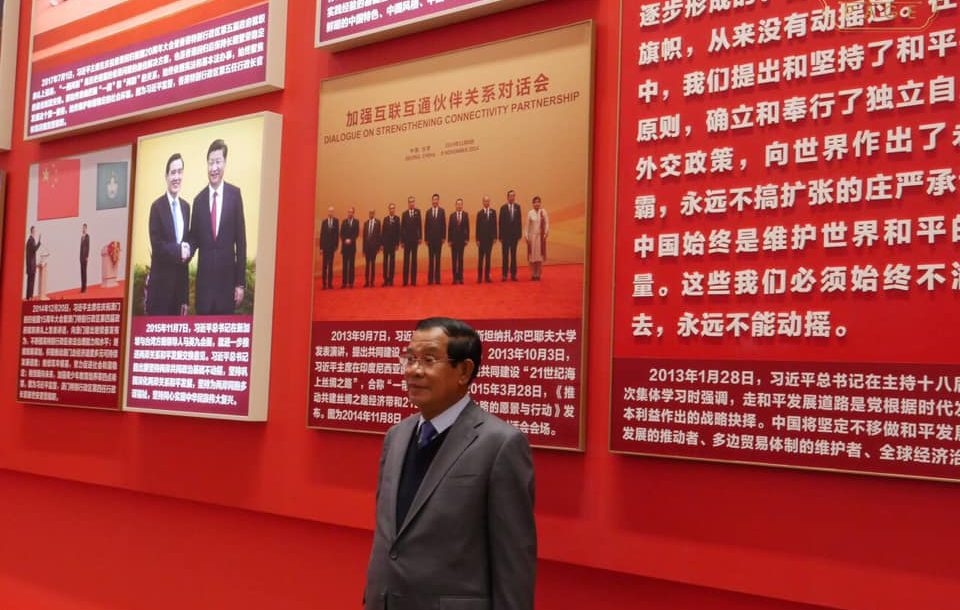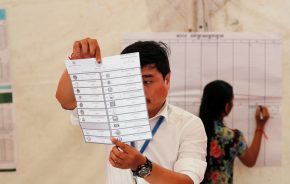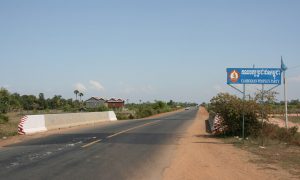There is an assumption by some commentators and analysts (myself included, on occasions) that just because China is now Cambodia’s closest political ally, the influence of Western nations has become negligible. As early as 2015, Sebastian Strangio noted in his book Hun Sen’s Cambodia that Western influence in Cambodia had “begun to wane.” Years on, this process was complete, according to many. In late 2017, Foreign Policy magazine reported on the “limits of US willingness or ability to influence Cambodia become clear when compared to China’s overwhelming influence there.” “Why the West was doomed to fail in Cambodia,” reads a headline from the Southeast Asia Globe last year. The exiled political analyst Kim Sok more recently asserted that Prime Minister Hun Sen “has no choice but to rely on the Chinese” as he increasingly pushes the West away.
China might be many things to Cambodia: the main provider of aid, investment and goods, a key geopolitical ally and something of a sagacious, avuncular mentor, an “ironclad friend” in Phnom Penh’s argot. But it isn’t, and most likely never will be, a major importer of Cambodia-produced goods. Instead, the major importers are the United States and the European Union. Together, they imported a little under two-thirds of all Cambodian exports in 2017. China, by contrast, imported just 6% of Cambodian total exports that year.
This matters greatly as both the US and EU now threaten to impose trade sanctions on Cambodia and re-introduce tariffs on its exports, a response to the Cambodian People’s Party (CPP)’s stage-management of last year’s general election, at which it won all the seats in the National Assembly, and its dissolution of the main opposition party, the Cambodian People’s Rescue Party (CNRP), the previous year. On 11 February, the EU formally started the 18-month process to remove Cambodia from its preferential Everything But Arms (EBA) scheme, a process that can be stopped if the EU thinks Phnom Penh is making sufficient progress in political and human rights reform.
Cambodia’s economy, despite years of high economic growth, remains highly dependent on exports. Products made in its garment and footwear sector—the largest employer, by sector, and largest contributor to GDP—almost exclusively are exported to Western nations. So should the EU withdraw Cambodia from its Everything But Arms (EBA) scheme, which grants Cambodian exporters duty and quote-free access to European markets, then the imposition of tariffs and quotas will certainly see exports to Europe plummet, causing a considerable slump in the Cambodian economy.
The government knows this. That’s why it planned for years to reduce the economy’s dependence on exports, chiefly low-cost manufactured goods. But progress has been slow, if not glacial. Granted, the tourism sector is booming thanks to increasing numbers of Chinese visitors. So too are the retail and property sectors. But exports are still prepotent. There is likely zero chance, despite the opinions of some analysts, that if Western democracies punish Phnom Penh by imposing higher tariffs on its exports or switching to suppliers in other nations, then China can simply jump in and bail out Cambodia. Quite obviously, China doesn’t need to import low-cost garments from Cambodia; it produces more than enough domestically. China’s main import to Cambodia, the raw materials stitched and sewed at Cambodia’s garment factories, would also be harmed if exports to Western nations slump. Chinese investors own many of the largest firms in Cambodia’s garment and footwear sector, so they will be among those who will lose out if exports dry up. Moreover, Beijing would have wasted millions, if not billions, of dollars on funding new roads, ports and special economic zones in Cambodia that were aimed at improving its export capabilities.
A more astonishing response from Beijing would be to simply hand Cambodia the cash to make up for any shortfall if exports to the West decline, a move some analysts think is possible. But it’s actually improbable. Would this come in the form of concessional loans or simply cash payments? The latter would be raise serious opposition in Beijing, where some policymakers and analysts are already becoming sceptical of the amount of money wasted through Xi Jinping’s signatory Belt and Road Initiative (BRI). At least for the BRI, however, Xi can point to the likelihood of future returns on investments. Few profits, though, would be reaped by simply bailing out Cambodia’s exporters.
The other option, bailouts in the form of loans, would be just as risky to the Cambodian government, which is struggling (though doesn’t admit it) with a growing public debt, especially to China. How would Phnom Penh square the circle of attaining more loans if exports, its chief means of acquiring foreign currency, dwindle? Moreover, say that new European tariffs on exports and reductions in trade see Cambodia’s exports figures slump just 10%, or roughly US$500 million a year. Would China be willing to provide this much annually for few returns? Also, what about the knock-on impact to other sectors in Cambodia if exports slump? It would certainly see investment and profits contract in the retail, construction, property and many other sectors, too. The real costs of even a minor slump in garment exports is likely to be felt throughout the economy, as well as by the millions of family members of workers who rely on remittances each month.
Whichever way one looks at it, Western nations still have considerable influence in Cambodia. They clearly know this and that’s why they are exerting pressure on Phnom Penh to make political reforms through threats to the country’s export-driven economy. The Cambodian government, for the most part, either says it isn’t concerned about threatened Western sanctions, claims that they are an assault on Cambodia’s sovereignty, or a move to punish only poor Cambodians. It hasn’t yet publicly admitted that its own actions may actually be the real cause.
But here’s the kicker: trade with the US and EU might be immensely import to Cambodia, but it’s only negligible to them. Indeed, the EU’s trade with Cambodia—which is overwhelmingly Europe importing Cambodian goods, not the other way around—is worth about a tenth of its trade with Vietnam, for example. So there wouldn’t be any mutual catastrophe if exports decline; it would simply be felt by one side. Just look at how the US is currently weathering new tariffs President Donald Trump imposed on Chinese imports, which could soon be raised even higher. Any loss in trade with Cambodia won’t even be felt as a tremor in America, though it would be an earthquake in Cambodia.
Where in the world is Cambodia?
The international community needs to take seriously the scepticism of many Cambodians about its intentions.
Amid all of this, pay attention to the irony of the situation. The CPP government has largely been allowed to do what it wants politically for so many years because of the fat profits reaped from its export-driven economy. Years, if not decades, of enviable economic growth rates have provided the CPP government with its main source of legitimacy; the economy is growing, wages are raising, unemployment is low, and we’ve created a brighter future for Cambodia, the party constantly says. Much of the public who might be unhappy with political conditions temper their emotions with this acknowledgment.
But the CPP government today faces a novel problem. While it was a low-cost, export-driven economy that gave the party so much legitimacy, the same export-driven economy is now its Achilles heel. However much it wants to drag itself under the parasol of Chinese patronage, it remains exposed to the storms of Western trade.
 Facebook
Facebook  Twitter
Twitter  Soundcloud
Soundcloud  Youtube
Youtube  Rss
Rss 



